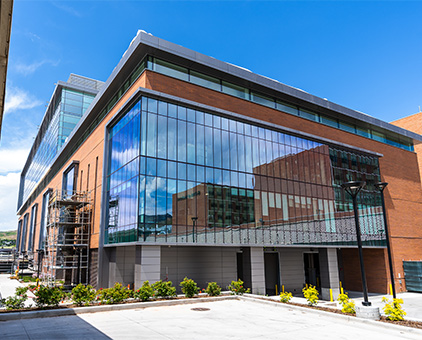Biology
Emphases: Anatomy & Physiology; Biochemistry; Cell & Molecular; Genetics & Genomics; Microbiology; Neurobiology; Ecology, Evolution & Environment; Plant Biology
Bennion
Center
Courses
Getting Started
- Explore the major with BIOL 1010 - Biology in the 21st Century.
- Start with BIOL 1610 and the accompanying lab class BIOL 1615.
- Take required chemistry, physics and math classes.
Making Progress
Meet with our award-winning biology advisors to:- Build a strategic academic plan.
- Explore scholarship opportunities.
- Choose appropriate math, chemistry, biology foundation, and core courses.
- Choose elective courses.
- Create a degree audit to track requirements.
- Connect with tutors in the Biology Learning Center.
- Explore the Science Research Initiative (SRI) and internship opportunities.
Finishing Up
- Take 5000 level courses in your final year.
- Complete degree and emphasis requirements.
- Meet with an advisor in the summer or early fall to prepare for graduation.
Community
Getting Started
- Declare your major early to get connected to activities in SBS.
- Meet with a science ambassador.
- Follow SBS and COS on social media to learn about opportunities.
Making Progress
- Engage in biology research.
- Apply to be a science ambassador or a USAC representative.
- Apply for the Science Research Initiative or the UROP program.
- Explore internship opportunities through the College.
- Consider living in the Crocker Science House or on the Kahlert Village science floor.
- Explore CEL classes in biology that connect you with community partners like clinics and state agencies.
Finishing Up
- Join the Alumni Association to participate in networking and support opportunities in a variety of fields.
Knowledge & Skills
Getting Started
- Use GE courses to develop skills in problem-solving, data analysis, and communication.
- Take the Freshman Seminar Series to learn about research in SBS and connect with faculty.
Making Progress
- Engage in laboratory or field research and co-curricular experiences.
- Apply to be a Learning or Teaching Assistant.
- Pursue internship opportunities and obtain vital transferable skills.
- Participate in community-engaged learning at the Bennion Center.
- Engage in career exploration by shadowing, volunteering, and building your professional network.
Finishing Up
- Present or publish your research findings.
- Ask faculty to serve as references as you apply for future programs or positions.
- Prepare for graduate admissions exams.
Transformation
Getting Started
- Attend office hours to get to know faculty.
- Explore post-graduation pathways with an internship coordinator or career coach.
- Attend a Learning Abroad 101 session.
Making Progress
- Become an LA or TA to connect with peers and faculty and gain professional work experience in the field.
- Go on a Learning Abroad trip.
- Attend a workshop through the Counseling Center or Center for Student Wellness.
- Volunteer at the Bennion Center and find community organizations and events that empower you.
- Meet with other students and alumni to find and give support.
Finishing Up
- Present your research or internship experience in symposia.
- Take CEL courses that focus on self-reflection.
- Apply for awards that support and celebrate your success.
Impact
Getting Started
- Volunteer with organizations that allow you to apply your education and skills.
- Get involved with ASUU or other student organizations that align with your interests.
Making Progress
- Talk with instructors about maximizing your educational choices in pursuit of your career goals.
- Serve on college and university committees.
- Organize study groups for yourself and your peers.
- Consider participating in the Bennion Center’s Alternative Breaks program.
- Look for part-time internship or employment opportunities that provide experience while you get an education.
Finishing Up
- Share your educational experiences online.
- Become a science ambassador, tutor, or USAC student representative.
- Apply to be a student leader for Alternative Breaks.
Careers
Getting Started
- Meet with the Science Career Coach.
- Attend the STEM Career Fair.
- Talk to faculty and alumni to determine if graduate school is required for your future career.
Making Progress
- Meet with your career coach to get help with your resume/CV and cover letters, practice interviewing, and prepare for the Career Fair.
- Attend the STEM Career Fair in the fall to learn about upcoming summer internships.
- Conduct a curiosity conversation with an alum in a desired career path.
- Keep your network and mentors updated on your progress and interests.
Finishing Up
- Update your resume/CV and cover letters.
- Attend the STEM Career Fair and start applying for jobs.
- Refine your interview skills by practicing with your career coach.
Start Your Career Journey
Find support at the Career and Professional Development Center (CPDC)
About the Major
Learning Outcomes
- Apply the principles of natural selection and mechanisms of genetic change to study diversity of life.
- Develop knowledge of molecular, cellular, and organismal structures to explain biodiversity and ecosystems.
- Interpret, communicate and work collaboratively to solve biological problems.
- Use mathematical and computational methods and tools to describe and understand living systems.
- Evaluate the interactions between biology and society, develop informed opinions on economic and societal issues and clearly communicate biological concepts and their implications to broad audiences.
Plan & Prepare
At the U, we plan for our students to have an exceptional Educational Experience identified by four broad categories we call the Learning Framework: Community, Knowledge & Skills, Transformation, and Impact. This major map will help you envision, explore, design, and plan your personalized Exceptional Education Experience with the Learning Framework at the core. In addition to assisting you in planning your coursework and navigating the requirements of your major, this map will help you incorporate other kinds of experiences to expand your knowledge, support your development, and prepare you for the future you want.


